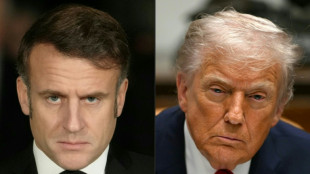
-
 Louvre heist probe: What we know
Louvre heist probe: What we know
-
Surging billionaire wealth a political threat, Oxfam warns as Davos opens

-
 Morocco fans stunned, disappointed as Senegal win Africa title
Morocco fans stunned, disappointed as Senegal win Africa title
-
Senegal fuelled by 'injustice' in AFCON final triumph, says hero Gueye

-
 Morocco coach Regragui laments 'shameful' scenes in AFCON final defeat
Morocco coach Regragui laments 'shameful' scenes in AFCON final defeat
-
Maye, Boutte wonder-catch carry Patriots past Texans

-
 Train collision in Spain kills 21, injures dozens
Train collision in Spain kills 21, injures dozens
-
Brazilians Abner, Endrick help Lyon climb to 4th in Ligue 1

-
 Barca beaten at Real Sociedad as Liga title race tightens
Barca beaten at Real Sociedad as Liga title race tightens
-
Socialist to face far-right candidate for Portugal's presidency

-
 Senegal stun hosts Morocco to win AFCON title after final walk-off protest
Senegal stun hosts Morocco to win AFCON title after final walk-off protest
-
Syria's leader agrees truce with Kurds after govt troops advance

-
 Morant shines as Grizzlies top Magic in London
Morant shines as Grizzlies top Magic in London
-
Real Sociedad end Barca winning streak to tighten Liga title race

-
 Senegal stun hosts Morocco to win AFCON title after ugly scenes mar final
Senegal stun hosts Morocco to win AFCON title after ugly scenes mar final
-
AC Milan in touch with Inter thanks to Fullkrug's first Serie A goal

-
 Lyon climb to fourth in Ligue 1 with victory over Brest
Lyon climb to fourth in Ligue 1 with victory over Brest
-
Morant shines as Grizzles top Magic in London

-
 Trump admin orders 1,500 troops to prepare for possible Minnesota deployment
Trump admin orders 1,500 troops to prepare for possible Minnesota deployment
-
Limited internet briefly returns in Iran after protest blackout

-
 South Africa declares national disaster as floods batter region
South Africa declares national disaster as floods batter region
-
Gang members in Guatemala kill seven police after prison crackdown: minister

-
 Villa's title bid rocked by Everton loss, Newcastle held at Wolves
Villa's title bid rocked by Everton loss, Newcastle held at Wolves
-
Dybala boosts Roma's Champions League hopes, Fiorentina honour Commisso

-
 Villa's title bid rocked by Everton loss, Newcastle held by Wolves
Villa's title bid rocked by Everton loss, Newcastle held by Wolves
-
'Avatar: Fire and Ash' at number one in N.America for fifth straight week

-
 Limited internet returns in Iran after protest blackout
Limited internet returns in Iran after protest blackout
-
Syria's leader agrees truce deal with Kurds after govt troops advance

-
 Smith's penalty sees Quins eliminate La Rochelle, Bordeaux secure top seeding
Smith's penalty sees Quins eliminate La Rochelle, Bordeaux secure top seeding
-
Atletico edge Alaves to strengthen Liga top-four hold

-
 Uganda president says opposition 'terrorists' in victory speech
Uganda president says opposition 'terrorists' in victory speech
-
New Zealand register first ODI series win in India despite Kohli ton

-
 Elvira wins Dubai Invitational after Lowry's last hole meltdown
Elvira wins Dubai Invitational after Lowry's last hole meltdown
-
Jeong snatches Union late draw at Stuttgart in Bundesliga

-
 Man Utd's Martinez hits back at Scholes after height jibes
Man Utd's Martinez hits back at Scholes after height jibes
-
Frank on the brink as Romero calls for unity amid Spurs 'disaster'

-
 Chile declares emergency as wildfires kill at least 15
Chile declares emergency as wildfires kill at least 15
-
Europe hits back at Trump tariff threat over Greenland

-
 Men's Fashion Week in Paris: what to watch
Men's Fashion Week in Paris: what to watch
-
McGrath goes top of slalom standings with Wengen win

-
 No Venus fairytale as Alcaraz, Sabalenka win Melbourne openers
No Venus fairytale as Alcaraz, Sabalenka win Melbourne openers
-
Iran considers 'gradually' restoring internet after shutdown

-
 Mitchell, Phillips tons guide New Zealand to 337-8 in ODI decider
Mitchell, Phillips tons guide New Zealand to 337-8 in ODI decider
-
Flailing Frankfurt sack coach Toppmoeller

-
 Kurdish forces withdraw from Syria's largest oil field as govt forces advance
Kurdish forces withdraw from Syria's largest oil field as govt forces advance
-
'Proud' Venus Williams, 45, exits Australian Open after epic battle

-
 Vonn in Olympic form with another World Cup podium in Tarvisio super-G
Vonn in Olympic form with another World Cup podium in Tarvisio super-G
-
Alcaraz kicks off career Grand Slam bid with tough Australian Open test

-
 Hosts Morocco face Mane's Senegal for AFCON glory
Hosts Morocco face Mane's Senegal for AFCON glory
-
Europe scrambles to respond to Trump tariff threat


'I don't have a voice in my head': Life with no inner monologue
Mel May only realised she was different while reading a news article one day.
"Wait, what? Some people hear a voice in their head?" she thought at the time.
She was stunned to discover that this was not just a figure of speech -- her friends were actually chatting to themselves in their minds.
May, a 30-year-old Australian video producer who lives in New York, remembers trying to explain to her family: "I don't have a voice in my head."
"My dad was like, 'You are lying'," she told AFP.
But her father came around once May started working with psychologists who agreed -- she is one of the very rare people who lack inner speech.
The idea that some people might not experience this phenomenon is so new that a clinical name, anendophasia, was only proposed for it in a paper last year.
The inner monologue has proven extremely difficult to study because it relies on people being able to describe how they think -- and it turns out we are unreliable narrators.
"People are ignorant about the characteristics of their own inner experience," Russell Hurlburt, a psychology professor at the University of Nevada, Las Vegas, told AFP.
"And it doesn't matter how confident you are," added Hurlburt, a pioneer in the field who has studied people with a range of inner experiences, including May.
Most people assume their inner voice is speaking all the time but it is actually just one of several phenomena of our inner experience, Hurlburt said.
Others include visual imagery, "unsymbolised thinking", feelings and sensory awareness.
- Only a quarter of the time? -
To study these phenomena, Hurlburt conducted research that would have a beeper go off at random while study participants were reading Franz Kafka's "The Metamorphosis" and describe what was in their head.
Rather than speaking the words in their inner voice, they were actually creating visual images -- "their own video" -- of the book, he said.
People also have different kinds of inner speech. Some have multiple voices, while bilingual people can switch languages.
Giordon Stark, a California-based particle physicist who was born deaf, has a mix of inner speech and visual images.
"I don't think of the word 'bed' in my head but I rather visualise the idea of my head hitting the pillow," which is similar to the sign language gesture for the word, the 34-year-old told AFP.
Pressed to estimate how often people are hearing an inner voice, Hurlburt emphasised that much more research is needed on the subject.
But a ballpark figure could be that people are "inner speaking" 20 to 25 percent of the time, he said.
That average includes people who have far more frequent speech and those with none, such as May.
"Her inner experience is close to being nothing but she's the exception rather than the rule," Hurlburt said.
Helene Loevenbruck, a leading inner voice researcher at France's Universite Grenoble Alpes, has had to change her mind on whether people like May could even exist.
"I thought everyone had an inner voice until very recently," she told AFP.
The idea ran counter to her previous work, which suggested inner speech was an important part of speaking out loud, serving as an "internal simulation".
But the work of Hurlburt -- and the discovery that some people cannot create mental images, a condition called aphantasia -- changed her mind.
- 'Pros and cons' -
May believes her lack of an inner voice is why she has never been an anxious person -- and why meditation is very easy for her.
Daniel Gregory, a philosopher specialising in inner speech at the University of Barcelona, said a potential disadvantage of having more inner speech is "a vulnerability to negative thought patterns, to rumination".
But we can also "use inner speech to encourage ourselves, to give ourselves positive messages", he told AFP.
May said a common response to hearing that she has no inner monologue is: "Wow, that must be amazing."
"I'm really quick to push back on that because I think certainly there are pros and cons," she said.
"I reflect a lot about what aspects of the lived experience I'm missing out on."
As well as not stressing about the future, May has a hard time remembering the past.
Loevenbruck said the people she had studied with aphantasia reported having "weird" autobiographical memories "because they have no sensory way of reliving a memory".
May emphasised that lacking an inner voice did not mean she was incapable of thought.
"I'm not dead inside. I know stuff and I feel stuff," said May, who plans to make a documentary about her experience.
Asked what was running through her head, she responded simply.
"Well, I'm sitting here, I'm listening to you and then I just automatically respond. And that's it.
"Isn't that how this happens for everyone?"
K.Hofmann--VB




